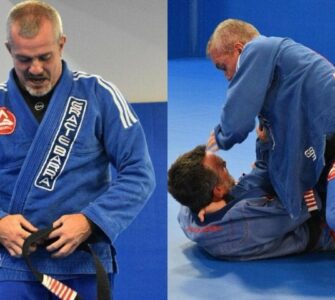John Danaher is by all means a sensation in contemporary jiu-jitsu – in fact he’s so intriguing even his parody is incredibly popular. Now while John makes most of his communication in a monologue like single paragraph the parody itself has him pegged down to bullet points.
A great example of the Danaher Death Squad hierarchy can be seen in the way Danaher relates to junior members such as Oliver Taza and or Ethan Crelinstein.
•Kohai means people I hate.
•That’s why I enter them in the higher weight categories.
•They keep winning though and not getting hurt.
•D*cks.
But what exactly does Senpai and Kohai mean?
Brandon Hetzler who is a Gracie Jiu-Jitsu black bet under Rickson & Kron Gracie, and creator of Jugoshin Ryu JuJutsu. explained the meaning in more detail:
In Japan, “senpai” is an upperclassman, someone of a higher age, or senior and “kōhai” is a protégée or junior. The mentor system is found at all levels of education, and in sports clubs, martial arts, businesses, and informal or social organizations. The relationship is an essential element of Japanese seniority-based status relationships, similar to the way that family and other relationships are decided based on age, in which even twins may be divided into elder and younger siblings.
In Japanese school sports clubs, such as baseball teams, the kōhai are usually expected to perform various menial tasks for the senpai, including washing clothes and cleaning. The kōhai may not be allowed to play the sport at all or have only limited opportunities to do so until they become senpai.
More than simple seniority, senpai implies a relationship with reciprocal obligations, somewhat similar to a mentoring relationship. A kōhai is expected to respect and obey their senpai, and the senpai in turn must guide, protect, and teach their kōhai as best they can. Senpai / kōhai relationships generally last for as long as the two people concerned stay in contact, even if the original context in which the senpai was senior is no longer relevant.
In Japanese martial arts, the term senpai generally refers to senior level students. They are expected to assist the sensei with younger or less experienced students.
Jugoshin Ryu Jujutsu
John Danaher Explains Why He Uses Japanese Hierarchy And What Makes His Squad Spectacular

















